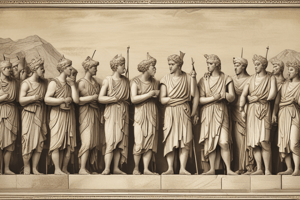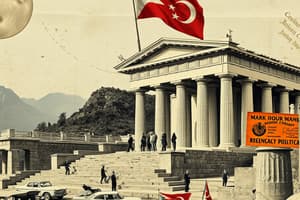Podcast
Questions and Answers
What was the primary source of income for most people in ancient Greece?
What was the primary source of income for most people in ancient Greece?
- Trading spices
- Mining precious metals
- Fishing
- Agriculture (correct)
How did the unequal distribution of resources impact the different classes in ancient Greece?
How did the unequal distribution of resources impact the different classes in ancient Greece?
- It influenced power dynamics among classes (correct)
- It led to equal opportunities for all classes
- It created social harmony and unity
- It resulted in every citizen owning land
What differentiated Sparta from Athens in terms of societal focus?
What differentiated Sparta from Athens in terms of societal focus?
- Athens emphasized military strength like Sparta
- Sparta prioritized discipline and military strength (correct)
- Sparta focused on democracy like Athens
- Athens valued obedience and discipline
How did Sparta counter its vulnerability to invasions?
How did Sparta counter its vulnerability to invasions?
What social structure did Spartans develop as a response to external threats?
What social structure did Spartans develop as a response to external threats?
How did some city-states aim to address imbalances in wealth distribution?
How did some city-states aim to address imbalances in wealth distribution?
What term emerged in Athens to mean 'rule by the people'?
What term emerged in Athens to mean 'rule by the people'?
Which of the following principles were early democratic ideals in Athens?
Which of the following principles were early democratic ideals in Athens?
What percentage of the population could vote in the Athenian democracy?
What percentage of the population could vote in the Athenian democracy?
What was the primary focus of Chapter 3 in Class 9?
What was the primary focus of Chapter 3 in Class 9?
Which city-state was known for its oligarchic government system?
Which city-state was known for its oligarchic government system?
What concept varied greatly across regions in ancient Greece?
What concept varied greatly across regions in ancient Greece?
Study Notes
Introduction
During Class 9, students learn about various aspects of history that help them understand the world around them. One such chapter is Chapter 3, which explores the evolution of democracy, primarily focusing on ancient Greece. This chapter delves into the political structure of Athens, the economic system, and the factors that led to the rise of Sparta against Athens. In this article, we will discuss key concepts from Class 9 Chapter 3, highlighting the importance of understanding the historical context and its relevance today.
Evolution of Democracy in Ancient Greece
Ancient Greek civilization was one of the most influential societies in human history due to their significant contributions in art, architecture, philosophy, politics, and more. Their concept of government, known as polis, varied greatly across regions, with some city-states being monarchies and others being oligarchies. However, the term 'democracy' emerged in Athens, where it meant 'rule by the people'.
The early democratic ideals in Athens were based on three principles: equality before the law, free speech, and popular sovereignty. These principles allowed citizens to participate in decision-making processes through public debates and voting, effectively empowering individuals to influence policy decisions. Despite these advancements, the Athenian democracy had limitations; only male landowners could vote, making up 1% to 2% of the population.
Economic System in Ancient Greece
While the political aspect of democracy played a crucial role in fostering a sense of community among citizens, the economic system in ancient Greece created social stratification. Agriculture was the primary source of income, with most people working as farmers. A small minority owned lands and controlled businesses, leading to significant disparities in wealth distribution.
This unequal distribution of resources influenced the dynamics between different classes. For instance, the wealthy class often held positions of power, using their status to maintain control over the masses. To counter these imbalances, some city-states implemented measures like redistribution of land or provision of subsidized food.
Rise of Sparta Against Athens
Despite Athens' progress in establishing a democratic society, it faced numerous challenges from neighboring city-states. Sparta, another prominent city-state, emerged as a major threat to Athens. Initially, both Athens and Sparta shared similar political systems, but over time, they diverged significantly. While Athens focused on democracy and individual rights, Sparta emphasized discipline, obedience, and military strength.
Sparta's strategic location made it vulnerable to invasions, prompting the establishment of a formidable army and rigid training methods designed to produce disciplined soldiers. As a result, Spartans developed unique social structures, including communal ownership of land and collective responsibility towards the state.
In conclusion, understanding the key concepts discussed in Class 9 Chapter 3 offers valuable insights into the development of democracy in ancient Greece, the functioning of their economic system, and the rise of rival powers like Sparta. By examining these historical events, we can appreciate how past civilizations shaped our modern world and better comprehend contemporary issues related to governance and societal structures.
Studying That Suits You
Use AI to generate personalized quizzes and flashcards to suit your learning preferences.
Description
Explore the evolution of democracy in ancient Greece, focusing on the political structure of Athens, the economic system, and the rise of Sparta against Athens. Learn about the early democratic principles, economic disparities, and the contrasting ideologies of Athens and Sparta.




